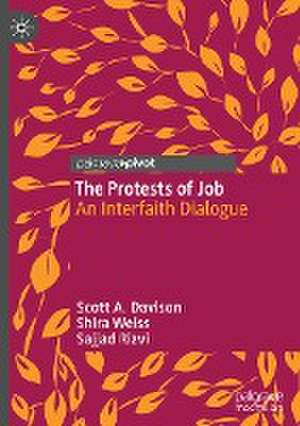The Protests of Job: An Interfaith Dialogue
Autor Scott A. Davison, Shira Weiss, Sajjad Rizvien Limba Engleză Hardback – 7 mai 2022
This book explores the protests of Job from the perspectives of Jewish, Christian, and Islamic religious and philosophical traditions. Shira Weiss examines how challenges to divine justice are understood from a Jewish theological perspective, including the pro-protest and anti-protest traditions within rabbinic literature, in an effort to explicate the ambiguous biblical text and Judaism’s attitude towards the suffering of the righteous. Scott Davison surveys Christian interpretations of the book of Job and the nature of suffering in general before turning to a comparison of the lamentations of Jesus and Job, with special attention to the question of whether complaints against God can be expressions of faith. Sajjad Rizvi presents the systematic ambiguity of being present in monistic approaches to reality as one response to evil and suffering in Islam, along with approaches that attempt a resolution through the essential erotic nature of the cosmos, and explores the suggestionthat Job is the hero of a metaphysical revolt that is the true sign of a friend of God. Each author also provides a response essay to the essays of the other two authors, creating an interfaith dialogue around the problem of evil and the idea of protest against the divine.
Preț: 383.08 lei
Nou
Puncte Express: 575
Preț estimativ în valută:
73.31€ • 75.63$ • 62.05£
73.31€ • 75.63$ • 62.05£
Carte tipărită la comandă
Livrare economică 04-18 martie
Preluare comenzi: 021 569.72.76
Specificații
ISBN-13: 9783030953720
ISBN-10: 3030953726
Pagini: 110
Ilustrații: VIII, 110 p.
Dimensiuni: 148 x 210 mm
Greutate: 0.3 kg
Ediția:1st ed. 2022
Editura: Springer International Publishing
Colecția Palgrave Macmillan
Locul publicării:Cham, Switzerland
ISBN-10: 3030953726
Pagini: 110
Ilustrații: VIII, 110 p.
Dimensiuni: 148 x 210 mm
Greutate: 0.3 kg
Ediția:1st ed. 2022
Editura: Springer International Publishing
Colecția Palgrave Macmillan
Locul publicării:Cham, Switzerland
Cuprins
1. Introduction.- 2. Protesting God in Jewish Interpretations of Job.- 3. Forsaken by God.- 4. Ineffability, Asymmetry and the Metaphysical Revolt: Some Reflections on the Narrative of Job from Muslim Traditions.- 5. Reply to Davison and Rizvi.- 6. Reply to Weiss and Rizvi.- 7. Reply to Weiss and Davison.
Notă biografică
Scott A. Davison is Professor of Philosophy at Morehead State University, USA. He is the author of On the Intrinsic Value of Everything (2011), Petitionary Prayer: A Philosophical Investigation (2017), and God and Prayer (2022), and serves as the associate editor for the journal Faith and Philosophy.
Shira Weiss teaches Jewish Thought at Yeshiva University, USA. She is the author of Joseph Albo on Free Choice: Exegetical Innovation in Medieval Jewish Philosophy (2017) and Ethical Ambiguity in the Hebrew Bible (2018). Her current project explores the ethics of violence in biblical narrative.
Sajjad Rizvi is Professor of Islamic Intellectual History and Director of the Institute of Arab and Islamic Studies at the University of Exeter, UK. A specialist on Islamic philosophical traditions since 1600, he is currently working on a monograph on philosophy in contemporary Iran.
Shira Weiss teaches Jewish Thought at Yeshiva University, USA. She is the author of Joseph Albo on Free Choice: Exegetical Innovation in Medieval Jewish Philosophy (2017) and Ethical Ambiguity in the Hebrew Bible (2018). Her current project explores the ethics of violence in biblical narrative.
Sajjad Rizvi is Professor of Islamic Intellectual History and Director of the Institute of Arab and Islamic Studies at the University of Exeter, UK. A specialist on Islamic philosophical traditions since 1600, he is currently working on a monograph on philosophy in contemporary Iran.
Textul de pe ultima copertă
“This book is a charming exchange of ideas between three superb scholars from the three main Abrahamic faiths, and a showcase of a very particular form of interfaith dialogue—or better still, interfaith encounter: a form of interfaith dialogue that doesn’t settle for trite comparison, nor fears respectful disagreement. It is the meeting of three minds, three traditions, three scholars, and three people, in an atmosphere of mutual respect.”
—Samuel Lebens, University of Haifa, Israel
This book explores the protests of Job from the perspectives of Jewish, Christian, and Islamic religious and philosophical traditions. Shira Weiss examines how challenges to divine justice are understood from a Jewish theological perspective, including the pro-protest and anti-protest traditions within rabbinic literature, in an effort to explicate the ambiguous biblical text and Judaism’s attitude towards the suffering of the righteous. Scott Davison surveys Christianinterpretations of the book of Job and the nature of suffering in general before turning to a comparison of the lamentations of Jesus and Job, with special attention to the question of whether complaints against God can be expressions of faith. Sajjad Rizvi presents the systematic ambiguity of being present in monistic approaches to reality as one response to evil and suffering in Islam, along with approaches that attempt a resolution through the essential erotic nature of the cosmos, and explores the suggestion that Job is the hero of a metaphysical revolt that is the true sign of a friend of God. Each author also provides a response essay to the essays of the other two authors, creating an interfaith dialogue around the problem of evil and the idea of protest against the divine.
Scott A. Davison is Professor of Philosophy at Morehead State University, USA.
Shira Weiss teaches Jewish Thought and is Asst. Director of the Sacks-Herenstein Center for Values and Leadership at Yeshiva University, USA.
Sajjad Rizvi is Professor of Islamic Intellectual History and Director of the Institute of Arab and Islamic Studies at the University of Exeter, UK.
Caracteristici
Presents an interfaith dialogue on Job, engaging three scholars from the Jewish, Christian, and Muslim traditions Uses multiple perspectives to think through theodicy without purporting to decisively reconcile divergent viewpoints Strives for consolation in the midst of the human condition rather than a definitive answer to the problem of evil
